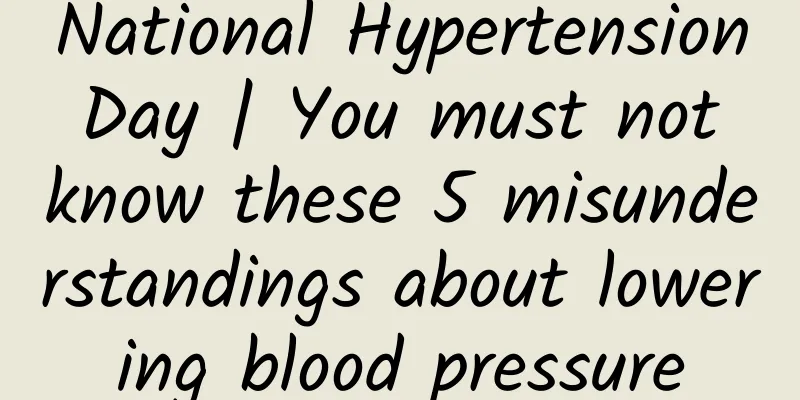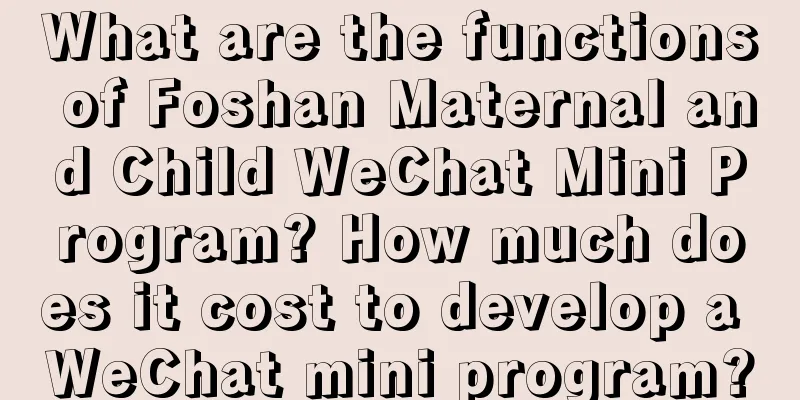National Hypertension Day | You must not know these 5 misunderstandings about lowering blood pressure

|
Hypertension is the most important risk factor for cardiovascular and cerebrovascular diseases and the leading cause of death from cardiovascular and cerebrovascular diseases in my country. Hypertension causes direct, long-term, and progressive damage to target organs such as the heart, brain, kidneys, and blood vessels. Therefore, controlling hypertension is the key to preventing and treating cardiovascular and cerebrovascular diseases. Copyright image, no permission to reprint The dangers of high blood pressure The harm of hypertension is mainly reflected in two aspects. On the one hand, high blood pressure is a mechanical injury to the arterial wall, which can make the "bad" cholesterol (i.e. low-density lipoprotein cholesterol) in the blood more likely to be deposited in the blood vessel wall, thus forming atherosclerotic plaques . Once atherosclerotic plaques occur in the arteries (including cerebral arteries, coronary arteries of the heart, and arteries of the lower limbs), further progression may lead to stroke, angina pectoris, acute myocardial infarction, or intermittent claudication of the lower limbs, and in severe cases, may directly lead to sudden cardiac death . Copyright image, no permission to reprint On the other hand, high blood pressure has direct damage to target organs such as the heart, brain, and kidneys . As blood pressure increases, the resistance encountered by the heart when pumping blood increases, and the heart workload increases. Over time, it will lead to left ventricular hypertrophy and enlargement, and the risk of heart failure, acute myocardial infarction, and sudden death will increase significantly. High blood pressure is one of the main risk factors for coronary heart disease. According to epidemiological surveys, high blood pressure can increase the risk of coronary heart disease by 5 times. Brain damage caused by hypertension includes cerebral arteriosclerosis, cerebral ischemia, cerebral infarction, cerebral hemorrhage , etc., among which cerebral hemorrhage is the most dangerous complication of hypertension and the main cause of death and disability caused by hypertension. Long-term hypertension causes increased pressure in the cerebral arteries, forming cerebral aneurysms. Once the aneurysm ruptures, cerebral hemorrhage occurs. After atherosclerotic plaques occur in the cerebral arteries, the blood vessels are narrowed and the brain is not supplied with enough blood. Once the plaques rupture, platelets in the blood aggregate to form thrombi, blocking the cerebral arteries and causing cerebral infarction. Whether it is cerebral hemorrhage or cerebral infarction, the clinical manifestations may include slurred speech, hemiplegia, and in severe cases, impaired consciousness or even death. Long-term high blood pressure can cause renal artery sclerosis and stenosis, increase the release of vasopressin and other angiotensin-stimulating substances, and reduce the amount of kidney tissue that can function normally, eventually leading to kidney shrinkage or even atrophy, renal insufficiency or even renal failure . Once the kidneys are damaged, the release of vasopressin and other angiotensin-stimulating substances will increase, further raising blood pressure and creating a vicious cycle. Copyright image, no permission to reprint What factors lead to Blood pressure fluctuations? As a physiological indicator, blood pressure is not fixed for 24 hours a day , but fluctuates . Even if patients with hypertension take antihypertensive drugs, their blood pressure will fluctuate due to various factors. Large and repeated fluctuations in blood pressure not only damage target organs, but also further damage the vascular endothelium, accelerate atherosclerosis, and thus aggravate hypertension. Clinical practice has shown that excessive fluctuations in blood pressure are an independent risk factor for cardiovascular and cerebrovascular events . Therefore, blood pressure fluctuations should be minimized. So, what factors cause blood pressure fluctuations? 1. High-salt diet: The main component of salt is sodium chloride. Sodium ions will retain water, increase blood volume, and thus increase blood pressure. Diuretics can lower blood pressure based on this principle (diuretics can excrete sodium ions through the kidneys, take away water, reduce blood volume, and lower blood pressure). Diuretics are the first-line antihypertensive drugs for the treatment of hypertension (including refractory hypertension). The relevant diagnosis and treatment guidelines for hypertension clearly point out that the daily sodium intake of hypertensive patients should not exceed 5 grams (including the sodium content of soy sauce and MSG). Therefore, hypertensive patients should strictly limit their sodium intake to lower blood pressure and reduce blood pressure fluctuations. Copyright image, no permission to reprint 2. Temperature : Cold weather can cause blood vessels to constrict, thus raising blood pressure. In hot weather, blood vessels on the surface of the body dilate to dissipate heat, causing blood pressure to drop. This is why patients with hypertension can appropriately reduce the amount of antihypertensive drugs in hot summers and increase the amount of antihypertensive drugs in cold winters. 3. Mental factors : Mental stress, overwork, and staying up late can cause blood vessels to constrict and blood pressure to rise. Emotional excitement can excite the sympathetic nerves, increase heart rate, and increase cardiac output, which can increase blood pressure. In addition, emotional excitement can also cause blood vessels to constrict and blood pressure to rise, especially when one is extremely sad or angry. Exercise can increase heart rate, cardiac output, and blood pressure. Therefore, patients with hypertension should be encouraged to perform aerobic exercise of moderate or lower intensity, rather than intense exercise of a competitive nature. Copyright image, no permission to reprint 4. Insomnia : Insomnia can disrupt the body's biological clock, causing the cerebral cortex to regulate the subcortical center, causing blood vessels to contract and blood pressure to rise. In turn, high blood pressure can aggravate insomnia. 5. Smoking : Cigarettes contain dozens of substances that are harmful to the human body. Smoking not only increases heart rate and cardiac output, but also causes blood vessels to constrict, leading to increased blood pressure. According to statistics, the prevalence of hypertension in smokers is much higher than that in non-smokers. 6. Alcoholism: Alcoholism will speed up the heart rate and increase cardiac output. Blood pressure may decrease immediately after drinking or alcoholism, but it will increase significantly the next day, leading to increased blood pressure fluctuations. In addition, alcohol will reduce the antihypertensive effect of antihypertensive drugs, making blood pressure more difficult to control. 7. Certain drugs and foods : steroid drugs (such as cortisone, prednisone), oral contraceptives, sympathomimetic drugs (such as ephedrine), nasal decongestants (such as furosemide nasal drops), codeine, grapefruit juice, etc. may increase blood pressure or reduce the efficacy of antihypertensive drugs. Misconceptions about lowering blood pressure Misconception 1: As long as there is no "discomfort", high blood pressure does not matter, so you do not need to take antihypertensive drugs. Some patients with hypertension have had high blood pressure for many years, and their bodies have adapted to this "hypertensive state", so they may not have obvious clinical symptoms (such as dizziness, headache, fatigue and other discomfort). If you think you don't take antihypertensive drugs because you don't feel "discomfort", you are wrong. You should know that long-term hypertension will inevitably lead to damage to target organs such as the heart, brain, and kidneys, and eventually lead to serious complications such as cerebral hemorrhage, cerebral infarction, hypertensive heart disease, coronary heart disease, and renal failure. Therefore, as long as you are diagnosed with hypertension, you must change your unhealthy lifestyle. At the same time, you must decide whether you need to monitor your blood pressure and whether you need to use antihypertensive drugs and which antihypertensive drugs to use based on the degree of blood pressure increase and clinical conditions. Misconception 2: There is no need to take medication after blood pressure drops to normal. Some hypertensive patients think that they do not need to take medicine after their blood pressure drops to normal, but they do not know that their blood pressure will rebound after stopping the medicine. Hypertensive patients should take antihypertensive medicine for a long time, and most patients need to take medicine for life. Effective, continuous, stable, and blood pressure reaching the target (<140/90mmHg) is the basic principle of antihypertensive treatment. Misconception 3: Taking the maintenance dose (the minimum dose to lower blood pressure to normal) of antihypertensive drugs after blood pressure drops to normal will cause blood pressure to continue to drop, so the drugs should be stopped. Taking maintenance antihypertensive drugs is an effective measure to avoid blood pressure rebound and keep blood pressure within the normal range. Maintenance antihypertensive drugs will not further reduce blood pressure within the normal range. Myth 4: The higher the price of antihypertensive drugs, the better the effect. The efficacy of antihypertensive drugs does not depend on the price of the drugs, but on the antihypertensive effect and whether the patient can adapt to the drugs. There are different types of antihypertensive drugs. Some people are suitable for the same antihypertensive drug, while others are not. Some people have good effects, while others have poor effects. Patients should choose antihypertensive drugs suitable for their condition under the guidance of doctors. Any antihypertensive drug that can reduce blood pressure to normal without obvious adverse reactions is suitable for them. Misconception 5: Long-term use of antihypertensive drugs can easily lead to drug resistance, so they should be changed frequently. Antihypertensive drugs are not as easy to develop drug resistance as antibiotics. As long as they can reduce blood pressure to normal, without obvious adverse reactions, and are suitable for other coexisting diseases (such as diabetes, coronary heart disease, etc.), they should be used long-term under the guidance of a doctor and do not need to be changed frequently. What foods are good for patients with high blood pressure? Beneficial? Because hypertension is closely related to hyperlipidemia, arteriosclerosis, and coronary heart disease, patients with hypertension should limit their intake of fatty foods , such as animal offal, cream, egg yolks, fish roe, animal oils, etc. Copyright image, no permission to reprint Hypertensive patients should limit their sodium intake . However, potassium intake is beneficial to the excretion of sodium and water, so hypertensive patients can appropriately increase their potassium intake. For example, they can eat more fruits high in potassium (such as oranges, bananas, apples, watermelons, etc.). Magnesium ions have a sedative and antispasmodic effect, which helps lower blood pressure. Therefore, patients with hypertension should eat more magnesium-rich foods , such as shiitake mushrooms, amaranth, dried shrimps, soy products, etc. Calcium ions are beneficial to lowering blood pressure. Patients with hypertension can eat more calcium-rich foods , such as milk, dried shrimps, fish, soy products, etc. In addition, patients with hypertension should quit smoking and limit alcohol consumption , and eat more vegetables and fruits . Daily diets should be mainly vegetable oils, which contain unsaturated fatty acids and are beneficial for preventing atherosclerosis. Eat more foods rich in dietary fiber, such as celery, bamboo shoots, leeks, etc., to keep bowel movements smooth. Celery, eggplant, carrots, shepherd's purse, mussels, kelp, black fungus, etc. are beneficial for lowering blood pressure, and patients with hypertension can choose to eat them. Black fungus, onions, and oatmeal can reduce blood viscosity and are beneficial for preventing myocardial infarction and cerebral infarction. Copyright image, no permission to reprint It should be noted that since sugar can be converted into fat in the body, patients with hypertension should not eat too much sweets. In short, high blood pressure is very harmful and blood pressure should be monitored regularly. Once diagnosed, after excluding secondary hypertension, primary hypertension should be considered. It is necessary to take antihypertensive drugs in a standardized and correct manner for a long time on the basis of a healthy lifestyle and keep blood pressure stable and within the target range. Author: Li Qinchou, Chief Physician, Nanchang Third Hospital Review | Russell New, Chief Physician/Professor, The First Affiliated Hospital of Chongqing Medical University Submitted by: Chinese Medical Association The cover image and the images in this article are from the copyright library Reproduction of image content is not authorized |
Recommend
New Wi-Fi technology is available that's better suited for smart homes
[[161680]] 1. New WiFi technology is emerging, mo...
Come and see them “give birth” again in the spring breeze, and “give birth” to their babies!
Spring is here, and it’s the season when everythi...
WHO warns! A new variant of the coronavirus is coming, and the existing vaccine system is at risk
The COVID-19 pandemic has lasted for two years si...
Can an individual make money by operating a WeChat mini program?
Q: Can I make money by operating a WeChat mini pr...
Dong Mingzhu "debates" with post-90s: I haven't heard of them being dissatisfied with the startup photos
You thought it was an oil painting, but it was ac...
18 e-commerce online activities & gameplay collection
In today's environment where there is no e-co...
Yan Jie 14-day extreme waist and abdomen shaping
Yan Jie's 14-day ultimate waist and abdomen s...
520 confession copy, my heart is pierced
520 is here, and a great opportunity for young pe...
The 13th UI Zero-Base Advanced Course of Plum Superman will be concluded in December 2020 [HD quality]
The 13th UI Zero-Base Advanced Course of Plum Sup...
Whose rhino also has "lip augmentation"? Let's meet this "rhino" with thick lips!
Rhinoceros have been found on the vast land of my...
From environment setup to memory analysis: A guide to Python code optimization
Code address: https://github.com/apatrascu/huntin...
Lao Xiang Ji’s brand “traffic code”!
As the most innovative Chinese fast food brand, L...
Self-taught! How sophisticated are today’s AI deception methods?
Many studies have shown that today's AI can a...
5 key points to build a private domain community from 0-1
Nowadays, private domain operations have graduall...
I recommend a project that can earn 300,000 yuan a year. It only requires one person to work 5 hours a day!
Today I will share with you a money-making projec...









